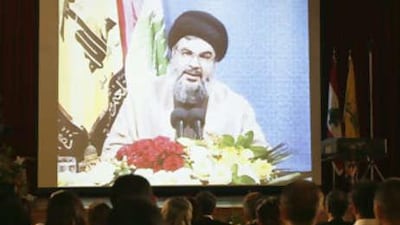BEIRUT // Hizbollah's participation in a new government of national unity, expected to be formed this week, will strengthen its hand in Lebanon at a time when the Shiite party faces a potential challenge from Syria, which is indirectly talking peace with Israel. Since Syria and Israel announced nearly two months ago that they were engaged in negotiations, Hizbollah, a close ally of Damascus, has studiously avoided making any comment.
If Syria were to reach a peace deal with Israel, it would have serious implications for Hizbollah. Syria is the geopolitical linchpin connecting Hizbollah to its principle backer, Iran, providing strategic depth for the Lebanese party and serving as a conduit for much of its arms supplies. Syria also is a leading component of the "resistance front", which also includes Iran, Hizbollah, Hamas and other groups opposed to the regional ambitions of Israel, the United States and Washington's Arab allies. The "front" risks disruption if Syria were to pull out, a prime motive for Israel to engage in peace discussions in the first place.
"Hizbollah is neither worried nor uneasy because this is not the first time that Syria has held peace talks with Israel. My understanding is that it will take a long time before anything materialises," said Ibrahim Mussawi, a lecturer in politics at the American University of Beirut who is close to Hizbollah. To some extent, both Syria and Israel are negotiating from positions of weakness. Ehud Olmert, the Israeli prime minister, is being investigated on corruption charges and his political rivals are manoeuvring in anticipation of his downfall. The Syrian regime faces numerous challenges: it remains the chief suspect in the assassination of Rafik Hariri, a former Lebanese prime minister, its oil supplies are nearly exhausted, its economy is deteriorating, and it is out of step with much of the Arab world because of its alliance with Iran.
Furthermore, the administration of George W Bush, the US president, has shown little interest in mediating between the two countries. In remarks to Le Figaro, a French daily newspaper, published yesterday, Bashar Assad, the Syrian president, said he is waiting for the next US administration to take office to give peace talks a boost. Amal Saad-Ghorayeb, a Lebanese political analyst and author of Hizbullah: Politics and Religion, said Syria has been sending "mixed signals" over its intentions. She said Syria's main motivation is to curry favour with the West and restore its poor relations with the Arab world, rather than embark on a major strategic realignment through a peace deal with Israel.
"It is winning them western support and they are re-entering the western fold and to some extent the Arab fold, but this is all that they want - diplomatic recognition internationally and regionally," she said. Indeed, Syria's relations with France have thawed considerably since December when Nicolas Sarkozy, the French president, had frozen dialogue between the two countries. Mr Assad has been mediating a rapprochement between Mahmoud Abbas, the Palestinian president, and Hamas, a role normally assigned to Egypt. And he recently concluded a successful tour of Arab countries in his capacity as president this year of the Arab League.
Israel hopes that Syria will end its three-decade alliance with Iran and freeze relations with groups like Hizbollah in exchange for the Golan Heights, captured by Israel in 1967. But some analysts doubt that Syria can commit to such a U-turn. "I think this is wishful thinking by Israel and its supporters in the West," said Timur Goksel, a Middle East security analyst and former United Nations officer in south Lebanon. "I do not see Syria making peace with Israel at the cost of its relations with Iran and therefore with Hizbollah."
Hizbollah has been here before. Between 1991 and 2000, Israel and Syria engaged in faltering peace talks brokered by the United States. The future status of Hizbollah, which was then fighting Israeli occupation troops in southern Lebanon, was a key topic of those negotiations, with Israel demanding its disarmament in the event of a peace deal with Syria. Syria controlled Lebanon politically at the time, and the widely held assumption was that Lebanon would swiftly make peace with Israel after Syria and then Hizbollah would be compelled to disarm under the watchful eye of Damascus.
Hizbollah, which possesses a strong streak of pragmatism in pressing its agenda, could have rationalised such a move to its supporters by insisting that peace with Israel would not last and that until the time came to pick up arms again there were other ways of "resisting" Israel on political and cultural levels, such as using its parliamentary presence to oppose the process of normalisation with the Jewish state.
Direct peace talks between Syria and Israel collapsed in 2000. Since then, Hizbollah has grown stronger militarily and politically. Today, it effectively holds the political balance of power in Lebanon and proved its military prowess in the war against Israel in 2006. Syria still wields considerable influence in Lebanon, but, since withdrawing its troops in 2005, it no longer has the power to dismantle Hizbollah's military wing in the event of peace with Israel.
Dr Mussawi said Hizbollah's military strength was an asset for Syria and Lebanon in future negotiations with Israel. "Why should Hizbollah be worried?" he said. "It has always called on governments to benefit from the resistance to improve their bargaining positions in negotiations." @Email:nblanford@thenational.ae

